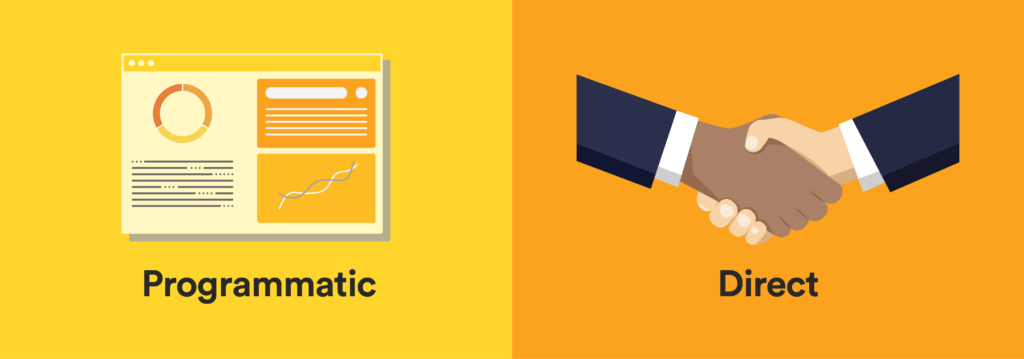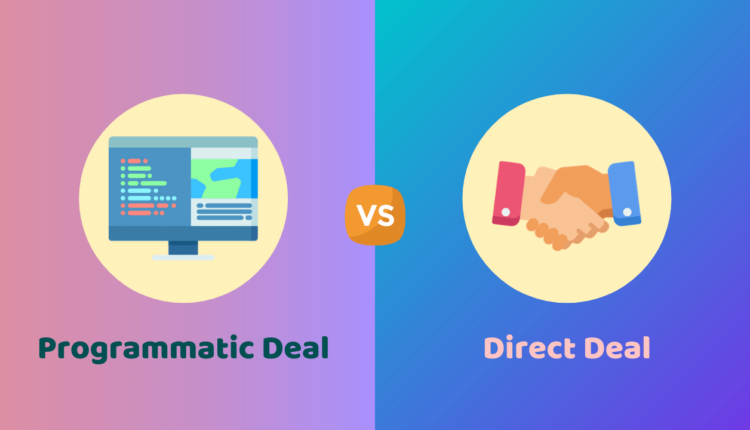In the digital advertising world, choosing the right method to buy and sell ad inventory can significantly impact campaign performance and efficiency. Two common approaches are programmatic advertising and direct deals. Each has its unique advantages and is suited for different types of advertising needs. This article breaks down the differences between programmatic and direct deals, thus helping you decide which method best fits your strategy.
What is Programmatic Advertising?
Programmatic advertising refers to the automated buying and selling of digital ad inventory using technology and data. It leverages algorithms and real-time bidding in order to optimize ad placements. Here’s a closer look at how it works:
How It Works
- Real-Time Bidding (RTB): Advertisers place bids for ad space in real-time through Demand-Side Platforms (DSPs). These bids are based on data such as user behavior, demographics, and location.
- Ad Exchanges: Ad exchanges facilitate the buying and selling of ad space between advertisers and publishers. They aggregate inventory from various sources and auction it to the highest bidder.
- Targeting and Optimization: Programmatic platforms use data to target specific audiences and optimize ad placements. This ensures that ads reach the most relevant users at the right time.
Advantages
- Efficiency: Automation speeds up the buying process, reducing manual effort and time.
- Precision: Advanced targeting options help advertisers reach their desired audience more accurately.
- Real-Time Adjustments: Advertisers can adjust campaigns in real-time based on performance data.
What are Direct Deals?
Direct deals involve negotiating and purchasing ad inventory directly between the advertiser and the publisher without intermediaries. This method is often used for premium ad placements as well as more controlled advertising environments. Here’s a closer look at direct deals:
1. How It Works
- Negotiation: Advertisers and publishers negotiate terms such as ad placement, pricing, and campaign goals directly. This can be done through email, phone calls, or meetings.
- Fixed Pricing: The cost of ad inventory is usually agreed upon in advance, therefore providing predictable expenses for the advertiser.
- Custom Agreements: Direct deals allow for customized agreements and specific requirements, such as exclusive ad placements or special ad formats.
2. Advantages
- Control: Advertisers have more control over where and how their ads are displayed.
- Transparency: Direct communication with publishers can indeed lead to greater transparency regarding ad placement and performance.
- Premium Inventory: Direct deals often provide access to high-quality or exclusive ad inventory.
Comparing Programmatic and Direct Deals
1. Efficiency vs. Customization
- Programmatic: Offers high efficiency through automation, reducing the time needed to buy and sell ad space. It is ideal for reaching a broad audience quickly.
- Direct Deals: Provide more customization and control over ad placements. They are suited for advertisers who want specific placements or have unique requirements.
2. Targeting and Data
- Programmatic: Utilizes extensive data for precise targeting and optimization. This data-driven approach helps in reaching specific audience segments effectively.
- Direct Deals: While data may be used, the targeting is less automated and relies more on the publisher’s knowledge of their audience. Custom targeting is possible but requires more manual effort.
3. Pricing
- Programmatic: Often involves real-time bidding, which can lead to varying costs based on competition and demand. Advertisers may pay more or less depending on bid outcomes.
- Direct Deals: Typically involve fixed pricing agreements, thus providing predictable costs for advertisers. Discounts or special rates may be negotiated based on volume or long-term partnerships.
4. Transparency and Relationships
- Programmatic: Offers transparency in terms of performance metrics but may lack personal relationships with publishers. The process is more automated and less personal.
- Direct Deals: Allow for direct communication and relationship building with publishers. This can lead to better transparency regarding ad placements and performance.
Choosing the Right Approach
The choice between programmatic and direct deals depends on several factors, such as campaign goals, budget, and desired control:
- Programmatic Advertising: Best for campaigns that require broad reach, real-time adjustments, and also data-driven targeting. It is suitable for advertisers looking for efficiency and automation.
- Direct Deals: Ideal for advertisers seeking specific placements, high-quality inventory, or a closer relationship with publishers. It is the best for premium campaigns and also for those with unique requirements.
Conclusion

Both programmatic advertising and direct deals have their distinct advantages and are valuable tools in digital advertising. Programmatic offers efficiency, precision, and real-time optimization, thus making it ideal for broad-reaching campaigns. Direct deals provide control, transparency, and access to premium inventory, therefore catering to advertisers with specific needs and preferences. Understanding the differences between these approaches can help you make informed decisions and further optimize your advertising strategy to achieve your goals effectively.
Frequently Asked Questions on Programmatic Advertising and Direct Deals
1. What is programmatic advertising?
Programmatic advertising is an automated method of not only buying but also selling digital ad inventory using technology and real-time bidding. It leverages data for precise targeting and also efficient ad placement.
2. What is a direct deal in advertising?
A direct deal involves negotiating and purchasing ad inventory directly between the advertiser and the publisher, indeed without intermediaries. It allows for customized agreements as well as fixed pricing.
3. What are the main advantages of programmatic advertising?
Programmatic advertising offers efficiency through automation, precise targeting using data, real-time optimization, and also the ability to reach a broad audience quickly.
4. What are the benefits of direct deals?
Direct deals provide more control over ad placements, greater transparency with publishers, access to premium or exclusive inventory, as well as customizable agreements tailored to specific needs.


